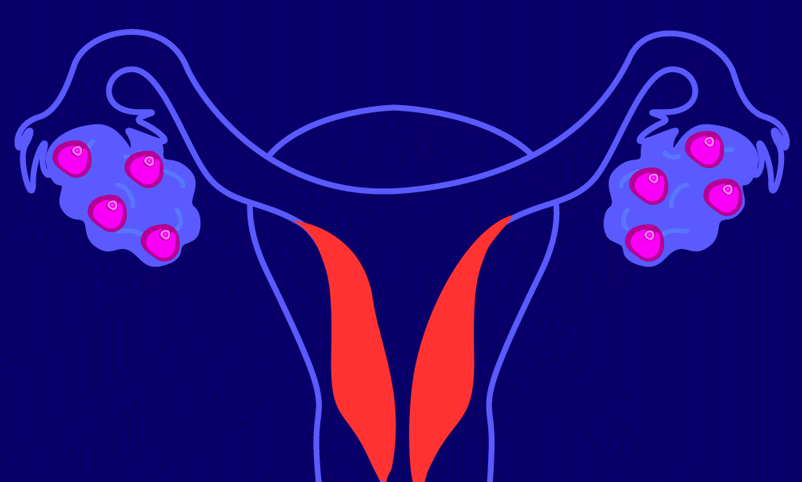A Doctor and a Menstruator Explain Periods
What is it like to have a period? What really goes on during the menstrual cycle? Inquiring minds (of ALL genders) would like to know, seriously.
At tabú, we live and breathe the expression, “knowledge is power.” So much goes on with our bodies that we don’t understand—whether for a lack of caring or a lack of comprehensive sex ed (and/or all of that societal shame and stigma). When we understand how our bodies work, we are empowered to make informed choices about them and can identify when something is off.
Plenty of people who have periods question, “What is actually going on (and when will this godforsaken, ahem, glorious experience end)?” Others, who don’t have periods might wonder, “What is it actually like to have one. We brought together a third-year non-menstruating medical student (that’s a mouthful), Evan Gooberman, MPH, OMS III, and a real-life menstruator, Pau Valencia, to explain the ins and outs of dear Aunt Flow. With more knowledge, we can all move forward on the path to period positivity!
Shed, baby, shed!
Why should we talk about periods?
Evan: There is nothing more mysterious than the human body. We know so much, and yet we know so little. We are always learning more information about the human body, and it’s exhilarating. It’s like an orgasm for your brain! One of the greatest aspects of the human body is our ability to reproduce (otherwise we wouldn’t be here today). A key component of the female reproductive system is the menstrual cycle, which can culminate in menstruation (commonly referred to as a period) or pregnancy.
There are many males who barely understand what a period is, and there are females, as well, who don’t really know what’s going on in their body. And, that’s OK. We luckily don’t have to understand how things work for them to do so. But, if you are interested in learning about how and why periods occur, now is your chance! Otherwise, avert your eyes!
Pau: I’ve had semi-regular periods for 16 years, but I only recently understood how much my entire cycle–and not just the bleeding part, as ubiquitous as it is– influences my day-to-day life.
And while I can’t speak for my fellow menstruators, there is a biological explanation for everything that happens to me throughout the “month” (which for some menstruators is about 28 days long, but for me is closer to 36) so my experience should sound somewhat familiar.
However, I can confidently say one thing: getting it in time is reassuring, sometimes the best news of the month (no babies, yay!), and yet somehow always annoying. Oh well.
What exactly is the menstrual cycle?
Evan: The menstrual cycle as a whole is a complex process that involves multiple organs to facilitate conception or prepare for the next opportunity for conception. Menstruation is the process of shedding the lining of the uterus (usually blood involved) when conception and implantation do not occur. BTW conception is the act of a sperm fertilizing an egg to form an embryo. Conception does not always result in a viable pregnancy.
There are multiple phases of the menstrual cycle. Most of them are the same whether or not conception occurs, but the end of the story has two potential outcomes. *Spoiler alert!*
Early & Middle Follicular Phase [Weeks 1-2]
Evan: Early Follicular Phase (starts immediately after last menses AKA period begins) [Week 1]—Several follicles (fluid-filled sacs that contain an egg) are stimulated within an ovary by an increase in estradiol (a type of estrogen) produced by the ovaries (signaled from hormones in the brain).
Middle Follicular Phase [Weeks 1-2]
A hormone from the brain called follicle stimulating hormone (FSH) influences the follicles to grow; the inner lining of the uterus (endometrium) thickens to support implantation.
Pau: Week one starts on the same day I start bleeding, and I have mixed feelings about it. Physically, I’m uncomfortable: crampy, bloated, with loose stool –I refuse to apologize for introducing you to the wonderful world of “period diarrhea”–, and generally meh-feeling. Also, since I got my IUD, my flow is pretty heavy, so I often feel weak.
That said, compared to the weeks before it (which we’ll review in a moment) my mood starts to pick up thanks to increasing estrogen levels. I suppose it’s nature’s way of keeping me from punching everyone who crosses my path, and it’s a big relief.
Late Follicular Phase [Week 2]
Evan: Late Follicular Phase [Week 2]—One follicle, based on the ability to produce the most estradiol, is selected as the dominant follicle and continues to grow as it prepares for ovulation (the other follicles break down); the uterine lining continues to thicken; the cervical mucus increases in amount and stretchiness
Pau: Week two is the best all around. The actual, real, true MVP of the cycle, in which estrogen levels are at their highest and progesterone at its lowest: I’m optimistic, energetic, and confident. Yoga poses come easier, I’m much less likely to snap at my lovely husband, and in the later days, when I’m about to ovulate, things get hot.
The human body is wise and eager to reproduce, so menstruators look and feel their best when they are at their most fertile. That makes them more attractive to potential suitors and more willing to have sex with them. That means their breasts and facial features are more symmetrical, their skin gets clearer, their eyes brighter and they want to jump their significant others at any chance. Not surprisingly, #TheHubs loves ovulation time.
Pro tip: Try to schedule job interviews, presentations, or anything you need to be your best self at during this week. The extra confidence will shine through and you’ll rock it.
Early Luteal Phase [Week 3]
Evan: Early Luteal Phase [Week 3]—Another hormone from the brain, luteinizing hormone (LH) surges, which stimulates the egg to develop further and then to be released by the follicle at the surface of the ovary (ovulation); an increase in body progesterone (another hormone) causes the uterine lining to stop thickening.
Pau: The week afterward –which we’ll call week three– is a confusing one for my body, who thinks I may have gotten pregnant but is not sure yet. So, just in case, I’ll want to eat everything in sight (because the baby might need it) but only if it doesn’t have a strong smell (because that might point to a threat for the imaginary baby).
Thanks to rising progesterone and decreasing estrogen, I’ll feel mellow, calm and want to stay home a lot more than in the first half of my cycle. New, adventurous activities and people will not be as attractive, because my body will be prompting me to stick to things that are safer for my (hypothetical) baby, and to people who are the likeliest to stay by my side to take care of it.
Middle to Late Luteal Phase [Week 4]
Evan: Middle to Late Luteal Phase [Week 4]—Without a fertilized egg, the hormone levels in the body signal the uterus that no conception occurred and thus it loses some of its blood supply and sheds its inner lining, which leads to vaginal bleeding (period).
Pau: Then comes week four, a.k.a. PMS week. To make the story short: my body is disappointed that we didn’t make a baby so it will sabotage itself by causing me pain and suffering. Just kidding. Not.
Since no egg implanted into the endometrial tissue, it now prepares itself to shed. Estrogens levels plummet and lead to irritability, unprompted crying, impatience and physical effects like nausea, insomnia, and headaches, aside from the ever annoying cramps. If you’ve ever had a period, you’re probably familiar with what we usually refer to as premenstrual syndrome, or PMS: negative emotions and physical discomfort that vary in intensity but are present throughout the day.
And that’s the reason why, when the bleeding happens and week one begins again, it’s a relief.
To be honest, there’s nothing I could write that would express the exhilarating, annoying, incredible experience of having a working cycle and knowing my body is doing the job it was built for, even if I hate it for two out of every five weeks. And it’s important that we keep in mind that this comes from my experience as a privileged, cisgender woman who has had unlimited access to menstrual products and information whenever she’s needed them.
Is the menstrual cycle the same for everyone?
Evan: I’ve explained the basics behind the biological processes involved in the menstrual cycle, but how it feels and the length of each phase can differ for everyone based on a variety of variables, such as taking hormonal birth control. Plus, the body doesn’t function based on what the textbook says.
Pau: The experience can vary greatly from person to person. However, I can confidently say one thing: getting your period in time is reassuring, sometimes the best news of the month (no babies, yay!), and yet somehow always annoying. Oh well. I would love to hear from you: is your PMS week bad? Have you ever noticed the upbeat mood of week 2? Are you relieved, or just annoyed, when you get your period?
Periods: FYI…
Ovulation occurs approximately 14 days before the onset of one’s period, so the whole ‘you ovulate 14 days after your period’ only applies to menstruators who have a regular cycle that occurs exactly every 28 days. The majority of menstruators have a 25-28 day cycle; only 1/9 menstruators have a precisely 28-day cycle.
Unlike males, females are born with all of their sex cells (eggs), called gametes. At birth, females have all of their eggs in a ‘frozen’ immature state which develop further later on. Females have approximately 1 million eggs when they’re born. At puberty, they are down to 300,000. 300-400 will be ovulated during a female’s reproductive lifetime. At menopause, a female will be down to less than 500 eggs, at which point the menstrual cycle stops, and so do periods. Thus, any vaginal bleeding after menopause (12 months of no periods) should be reported to your doctor.
To learn more about periods, check out Periods 101!
Diagrams illustrated by Marcy Gooberman.
Evan Gooberman is a third year medical student at the Philadelphia College of Osteopathic Medicine, the Chair of the Alan Z. Gartzman, D.O. Memorial Fund, and the proud brother of our fabulous Lead Designer, Marcy Gooberman.
Pau is a Mexican feminist and journalist living in Madrid. Writing for tabú is a part of her scheme to empower young women through education.



Modern sex essentials
Related reading
Check out the pod
Plant-based, Science-backed Supplements
use code TABU for 20% off
This article may contain affiliate links. Meaning? If you click one and make a purchase, we earn a commission. This helps us keep creating fire content so you can stay informed and empowered. 🔥 Thank you!














New to sexting? Here’s what you need to know to keep it spicy, flirty, and absolutely irresistible (in a way that feels natural to you)